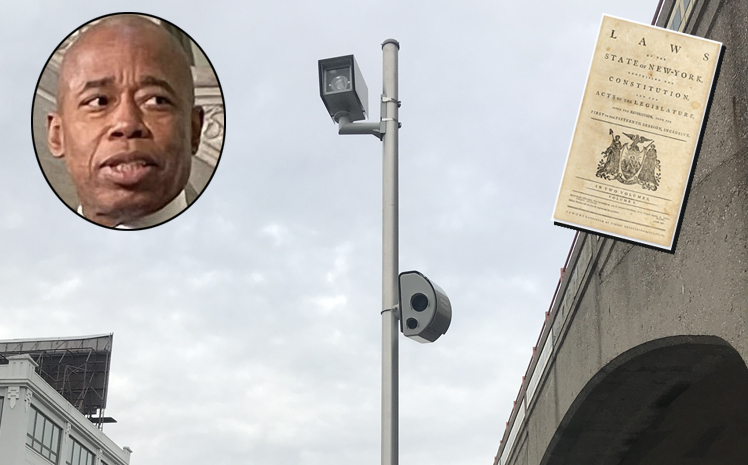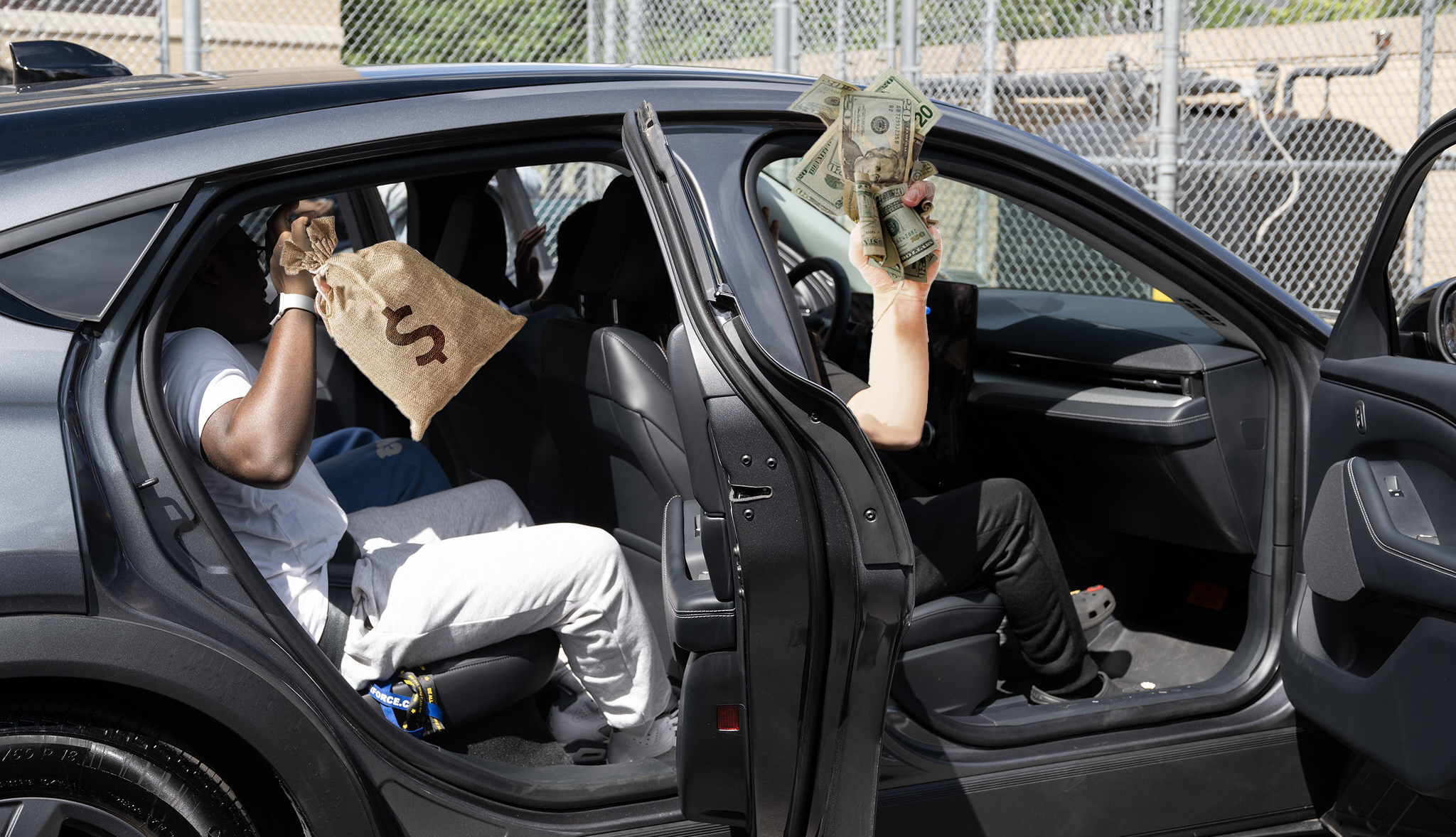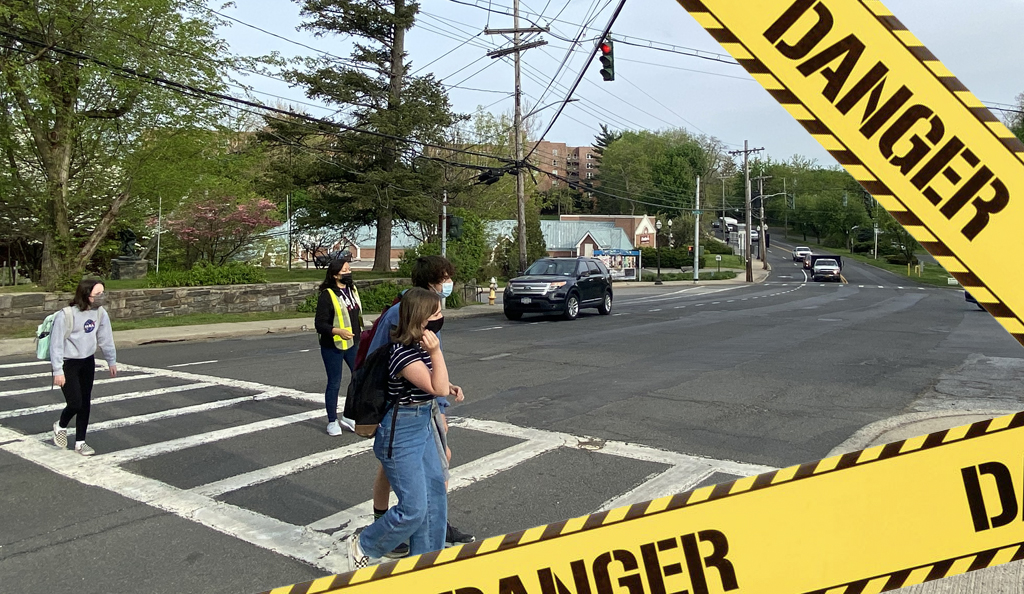Mayor Adams will not get what he claims he wants from the state legislature this year — city control of the speed- and red-light camera programs — dealing a devastating blow to advocates' dream of no longer having to beg Albany to reauthorize the life-saving system every few years, according to a state senator who has been at the center of the issue.
But with the complicated "home rule" issue apparently off the table, Sen. Andrew Gounardes (D-Brooklyn) says he's shifting his focus to ensuring that the legislature pass his existing bill, S5602, which would expand the number and lengthen the operating hours of the city's camera systems, which will be shut off in July without Albany renewal.
"We don't have enough time to make [home rule] happen," Gounardes told Streetsblog in an exclusive chat on Wednesday. "I'm just being realistic, I have shifted my focus to pushing for expanding and renewing speed cameras."
It's unclear if the legislature, which undertakes this particular performative dance every few years, will pass Gounardes's bill, though the senator said he's "optimistic."
"But nothing is ever set in stone," he added. "There's 10 days left [in the legislative session]." He urged advocates to "call your senator, call your [assembly member]."
The breakdown of the effort to give New York City sole power over the speed camera program through a "home rule" resolution will come as a surprise to most activists and even, possibly to City Hall, which has said consistently that it wants the legislature to act so that city speed cameras can operate 24 hours a day, seven days a week instead of merely 6 a.m. to 10 p.m. on weekdays.
The problem? The legislature can't merely act to give the city home rule. And upstate Assembly Member William Magnarelli (D-Syracuse), who chairs the Transportation Committee and has long been seen as an impediment to street safety, told Streetsblog on Tuesday that he was willing to pass the home rule request but for one problem: the Adams administration never got its act together to actually craft it. Magnarelli squarely put the blame on City Hall for failing to follow the rules and send lawmakers a formal request.
"We don't pass local laws without being asked to do so. They have to deliver a home rule [request] for us to vote on it," Magnarelli said. “I will make sure, if we get home rule before June 2, we will pass it out of the Transportation Committee. I have some control over that. If I get home rule, I will pass them out of the committee."
Magnarelli's comments echo gripes by other Albany lawmakers published by the New York Post on Wednesday, featuring pols complaining that City Hall has exhibited a "dysfunctional outreach effort" in the statehouse.
“There’s not any clear lines of command,” a "key state lawmaker" told the Post, added that negotiations haven't even started on some key Adams Administration priorities. “We only have a couple weeks left, so things that aren’t getting done now just will be left out.”
With Streetsblog, Gounardes said the blame is not just on City Hall. The issue of home rule is simply complicated.
"I think the city has articulated what they would like to see, [so it's] a confluence of factors, not just City Hall," Gounardes said. "It's a much heavier lift. I fully support home rule for the city, but we need a lot more conversations about what that actually means. Multiple people have multiple definitions of what home rule could be. We don't have enough time to make that happen."
Department of Transportation Commissioner Ydanis Rodriguez has strongly backed home rule so that cameras can stay on all day every day, but on Wednesday, neither City Hall nor DOT responded to requests for comment about the likely failure this session of home rule.
But after initial publication of this story, DOT all but confirmed that home rule this year is dead.
"We’re working with legislators to amend existing legislation that would expand existing automated enforcement programs," said a spokesperson at DOT.
If our streets aren’t safe, our city isn’t safe. Period.
— Mayor Eric Adams (@NYCMayor) March 4, 2022
Home Rule allows the people who know our city best to have the tools to keep our streets safe for every New Yorker. https://t.co/vzHkYdrPOm
With the focus now shifted entirely to Gounardes's bill to reauthorize and expand speed cameras, attention could again turn to Magnarelli, not only because of his past record of opposing or at least stalling many bills sought by activists — last year, Magnarelli stalled and killed a bill to let New York City set its own speed limits, Streetsblog reported at the time. But also because since 2017, Magnarelli’s campaign has received $23,650 in donations from companies linked to the car culture, including $4,000 from the Ford Motor Company Civic Action Fund, $3,400 from the Automobile Dealers Of NY PAC, $3,000 from the General Motors Company PAC and $500 from Tesla, according to state campaign finance records. Last year, Magnarelli stalled and killed a bill to let New York City set its own speed limits, Streetsblog reported at the time.
Gounardes has another crucial bill, S8328, that would not only again reauthorize red-light cameras, but also expand the current cap from roughly 150 intersections to 1,325 intersections. It is unclear if Magnarelli will let that through also.
Why home rule is so important
Advocates for home rule say it is unfair that a handful of lawmakers from places more than 300 miles from the city have so much power over the five boroughs, forcing advocates to waste valuable time and resources to trek up to Albany every few years to beg legislators to pass and repass a bunch of bills that only affect New York City.
For example, the city’s red-light program — the first in the nation — launched in 1994 after authorization from the state. It’s so far been extended by legislators in Albany eight times. But the most-recent extension will expire at the end of 2024, and is still capped at a paltry one percent of intersections. And, of course, there's the speed camera system, frozen at 2,000 cameras in 750 school zones. Even if Gounardes's reauthorization bill passes, it will expire in 2025, requiring yet another trip up to Albany for another round of reauthorization sausage-making.
The last time the camera system brushed up against death was in 2018, when Senate Republicans failed to renew and expand the speed camera program, letting it expire, leaving New Yorkers, and especially kids, more vulnerable than ever to reckless drivers. But in the 11th hour, then-Gov. Cuomo signed an emergency declaration reinstating their authorization to take effect before kids went back to the classroom.
But that shouldn't have had to happen, and shouldn't again, pols and advocates say. And with home rule it wouldn’t.
An exhausting slog
One advocate, Aaron Charlop Powers, whose mother was killed while riding her bike to work in the Bronx in 2010, told Streetsblog he’s so far been up to Albany about five times since his mother’s death to fight for safer streets.
He most recently went up on May 4, when he had to relive the trauma of how his mother was killed all over again throughout a series of meetings with legislators, many of whom are unsympathetic, all to ensure that what happened to her doesn’t happen again. Though it has again, and again, and again.
“It feels confusing and a source of despair to be advocating for things that are so obvious, and have such clear evidence. To have to come to Albany routinely on this cadence to argue for the city's ability to do what it should do — implement a series of policies that are appropriate and life saving — that is challenging enough and defies logic,” he said. “It’s not easy to tell the story of your mother being run over by a bus, and I choose to do it in an effort to try to make change. But I feel some motivation to do it in service of a virtuous goal. I’m pouring my heart out for callous, calculated politicians for something I shouldn't have to do.”
The need for Albany approval also opens the door for political horse trading by Republican pols upstate, and even in the city. Like in 2017, the Senate Republicans obstructed and nearly killed the life-saving cameras by refusing to support their reauthorization unless the mayor agreed to put an armed cop in every school.
How do we get it?
Short of a change to the New York State Constitution that's been amended several times since its fifth iteration was written in 1938, state lawmakers must grant New York City the power through legislation.
But an actual bill on home rule has not been introduced, let alone fully drafted, so all the nuts and bolts of how it would work are not yet clear, according to Gounardes.
It's not so simple because it's never been pushed for as one collective package before now, and it'd be a big change to the power structure, said Gounardes.
“We’ve never really combined the programs together in one concept before," he said. "If the legislature decides to grant the city home rule, there’d be no expirations on individual programs, depending on what the contours of what home rule look like. It’s a new concept, there’s been no legislative push on this up until this year.”
Mayors de Blasio and Adams get the blame for that, given that both have talked a lot about the need for home rule, but neither, apparently, did anything to get it.
Assembly Speaker Carl Heastie (D-Bronx) did not respond to a request for comment; and Senate Majority Leader Andrea Stewart-Cousins (D-Yonkers) declined to comment directly, but a Senate majority conference spokesperson said only in a statement to Streetsblog that the issues are still being worked out.
"This issue is being discussed in conference and we will move forward with the best interests of New Yorkers in mind to ultimately save lives. This is a critical matter that will be addressed," said Emily Bruggeman.
Also on the agenda for advocates this year is passing the Crash Victim Rights and Safety Act, a package of eight bills to address the growing crisis on city streets, which include:
- “Sammy’s Law” (S524/A4655) — This bill would allow New York City to set speed limits lower than 25 miles per hour rather than having to beg Albany lawmakers to let them do it. Last year’s version of the bill passed the Senate, but did not make it to the Assembly floor.
- Statewide speed limit authority (S2021/A1007) — Building on “Sammy’s Law,” this bill will allow other cities, not just New York, to lower their speed limits to 25 miles per hour.
- Complete Streets (S3897/A6454A) — Building on a bill that never even got out of his own Transportation Committee, Sen. Tim Kennedy of Buffalo seeks to increase state funding “for construction and improvement by the [state] where the municipality agrees to fund a complete street design.”
- Complete Streets Maintenance (S5130/A7782) — After four tries, Kennedy finally got this bill passed in the Senate last year, but the Assembly didn’t get it done. The bill would require projects “to include, when possible, complete street design features in resurfacing, maintenance and pavement recycling projects and further enable safe access to public roads for all users.”
- Safe Passage (S4529/A547) — This bill, which has failed to pass the Assembly in three consecutive sessions, will require drivers to give at least three feet of space when they pass a bicyclist.
- Create a DMV pre-licensing course (S1078A/A5084) — Will the second time be the charm for this bill, which would require the Department of Motor Vehicles to teach drivers about “pedestrian and bicyclist safety as part of the drivers pre-licensing course.”
- Crash Victim Bill of Rights (S8152) — Having failed to pass this last year, Sen. Brad Hoylman is back with a bill that would require crash reports “to be delivered to victims of accidents or their next of kin; require victim impact statements to be delivered at traffic infraction hearings by injured parties or their next of kin; [and] require employers to grant absence of leave to employees delivering a victim impact statement at a traffic infraction hearing.”
Eight bills in the Crash Victim Rights & Safety Act.
— Families For Safe Streets (@NYC_SafeStreets) May 4, 2022
100+ organizations across the state.
Countless partners in the Assembly and Senate.
New York needs safe streets now. Let's get it done.
Join us: https://t.co/byeh9l0cQP | #SafeStreetsNowNY pic.twitter.com/Fy0N8ayzr8
— with Gersh Kuntzman
After initial publication, this story has been updated with a comment from NYC DOT






